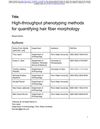 September 2023 in “Nature communications”
September 2023 in “Nature communications” Alk1 in specific cells is crucial for proper nerve branching and hair function.
 9 citations,
March 2020 in “Gene”
9 citations,
March 2020 in “Gene” Certain gene variants in estrogen receptors are linked to polycystic ovary syndrome, mainly affecting metabolism, in Tunisian women.
 129 citations,
January 2019 in “Clinical medicine insights”
129 citations,
January 2019 in “Clinical medicine insights” Obesity worsens PCOS symptoms, and PCOS may lead to more weight gain; managing both requires a holistic approach that includes mental health.
 10 citations,
January 2003 in “Journal der Deutschen Dermatologischen Gesellschaft”
10 citations,
January 2003 in “Journal der Deutschen Dermatologischen Gesellschaft” Hydroxychloroquine helped improve scleromyxoedema in patients, but caused side effects in some.
 18 citations,
January 2017 in “Dermatologic Surgery”
18 citations,
January 2017 in “Dermatologic Surgery” Combining cosmetic procedures with lifestyle changes improves antiaging results.
 December 2023 in “Aggregate”
December 2023 in “Aggregate” Scientists are using clumps of special stem cells to improve organ repair.
70 citations,
February 2016 in “EMBO reports” Scientists found a specific group of itch-sensing nerve cells in mice important for feeling itch but not for sensing heat or touch.
 100 citations,
April 2010 in “Expert Opinion on Pharmacotherapy”
100 citations,
April 2010 in “Expert Opinion on Pharmacotherapy” Hair loss in men treated best with early medication or transplant, new treatments researched.
 July 2019 in “Facial Plastic Surgery Clinics of North America”
July 2019 in “Facial Plastic Surgery Clinics of North America” New techniques and technologies are improving facial plastic and reconstructive surgery.
 13 citations,
January 2022 in “Stem cell reviews and reports”
13 citations,
January 2022 in “Stem cell reviews and reports” Mouse stem cells from hair follicles can improve wound healing and reduce scarring.
 December 2021 in “Molecular genetics and genomics”
December 2021 in “Molecular genetics and genomics” Cats with abnormal hair had DSG4 gene changes causing hair problems.
 112 citations,
October 2005 in “Mayo Clinic Proceedings”
112 citations,
October 2005 in “Mayo Clinic Proceedings” Minoxidil and finasteride can slow hair loss and stimulate regrowth, but won't restore all lost hair or reverse complete baldness.
 242 citations,
February 2016 in “Science”
242 citations,
February 2016 in “Science” Hair loss and aging are caused by the breakdown of a key protein in hair stem cells.
35 citations,
August 2009 in “Differentiation” Desmoglein 4 is controlled by specific proteins that affect hair growth.
 16 citations,
March 2020 in “Facial Plastic Surgery Clinics of North America”
16 citations,
March 2020 in “Facial Plastic Surgery Clinics of North America” Platelet-Rich Plasma (PRP), a substance from a patient's own blood, can stimulate hair regrowth in people with Androgenetic Alopecia (AGA) who haven't had success with other treatments, but more research is needed to optimize its use.
 33 citations,
June 2017 in “Developmental Biology”
33 citations,
June 2017 in “Developmental Biology” Mice can correct hair follicle orientation without certain genes, but proper overall alignment needs those genes.
 34 citations,
January 2018 in “International Journal of Dermatology”
34 citations,
January 2018 in “International Journal of Dermatology” Scalp cooling is the most effective FDA-approved method to prevent chemotherapy-induced hair loss, but more research is needed for other treatments.
 1 citations,
November 2020 in “bioRxiv (Cold Spring Harbor Laboratory)”
1 citations,
November 2020 in “bioRxiv (Cold Spring Harbor Laboratory)” Quantifying hair shape is better than using racial categories for understanding hair characteristics.
 97 citations,
September 2006 in “Pharmaceutical Research”
97 citations,
September 2006 in “Pharmaceutical Research” No treatment fully prevents hair loss from chemotherapy yet.
 July 2023 in “bioRxiv (Cold Spring Harbor Laboratory)”
July 2023 in “bioRxiv (Cold Spring Harbor Laboratory)” Chitosan slows root hair growth and causes a buildup of callose at low concentrations, but at high concentrations, it only inhibits growth without callose buildup.
 January 2024 in “International Journal of Health Science”
January 2024 in “International Journal of Health Science” Scalp cooling and low-power light therapy show promise in reducing chemotherapy-induced hair loss but need more research.
 4 citations,
June 2013 in “The Journal of Rheumatology”
4 citations,
June 2013 in “The Journal of Rheumatology” The document concludes that various findings in rheumatology offer insights into disease severity, treatment responses, and potential risks in medication, with some limitations due to unspecified participant numbers.
9 citations,
May 2021 in “Frontiers in aging neuroscience” Taking triterpenoids from Ganoderma lucidum over a long time can help slow down brain aging and improve overall health in mice.
 January 2024 in “bioRxiv (Cold Spring Harbor Laboratory)”
January 2024 in “bioRxiv (Cold Spring Harbor Laboratory)” A specific enzyme is essential for proper hair follicle stem cell development and healthy skin.
 April 2003 in “Experimental Dermatology”
April 2003 in “Experimental Dermatology” The workshop highlighted the genetic links and psychological impacts of hair loss and skin disorders.
 67 citations,
December 2019 in “PloS one”
67 citations,
December 2019 in “PloS one” Beta-caryophyllene helps improve wound healing in mice, especially in females.
 6 citations,
January 2011 in “Springer eBooks”
6 citations,
January 2011 in “Springer eBooks” Nutrition is important for skin health, and changing diet can help prevent and treat skin diseases.
 11 citations,
April 2017 in “Journal of The European Academy of Dermatology and Venereology”
11 citations,
April 2017 in “Journal of The European Academy of Dermatology and Venereology” Found different long non-coding RNAs in balding Chinese men, which may help create new treatments.
 August 2023 in “Natural Resources for Human Health”
August 2023 in “Natural Resources for Human Health” Vegetarians should take B vitamin supplements to avoid health issues.
 January 2024 in “Authorea (Authorea)”
January 2024 in “Authorea (Authorea)” Nanomaterials can significantly improve wound healing and future treatments may include smart, real-time monitoring.



























